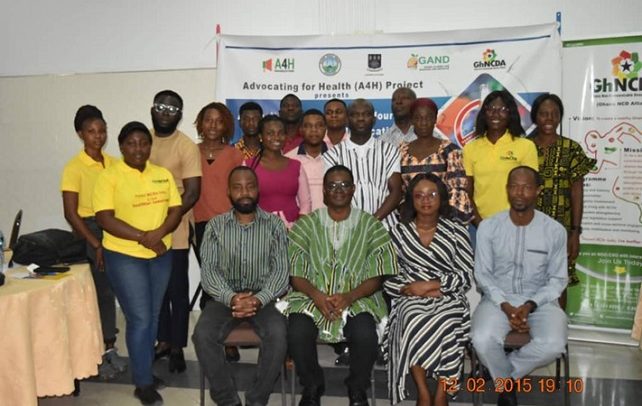Participants at the workshop
Government has been urged to increase taxes on sugar sweetened beverages (SSB) to at least 20 per cent as recommended by the World Health Organisation (WHO).
According to the Ghana Non-Communicable Disease Alliance (GhNCDA), the WHO has endorsed health taxes as part of evidence-based strategies for the prevention and control of NCDs like type 2 diabetes, obesity and dental decay.
Professor at the School of Public Health, Amos Laar, showcasing the realistic legal pathway to enact SSBs tax in Ghana, said countries that have implemented higher taxes have seen a significant decrease in SSB consumption.
“Mexico’s 10 per cent tax on sugar-sweetened beverages resulted in a 5·5 per cent decrease in sales by the end of the first year, and a 9·7 drop in sales in the second year, with the largest decrease amongst the most socioeconomically disadvantaged.
“In Chile, the SSB tax was able to reduce the monthly purchased volume of the higher-taxed, sugary soft drinks by 21.6 per cent,” he disclosed as evidence.
Professor Laar was speaking at a sensitisation workshop for journalists on the health risks associated with excessive SSB consumption in order to support the Advocating Health (A4H) Project, which seeks to generate evidence to support advocacy, scholar activism, against excessive SSB consumption.
This project is a collaboration between the School of Public Health, University of Ghana, Legon; Ghana NCD Alliance (GhNCDA); Ghana Public Health Association (GPHA) and Ghana Academy of Nutrition and Dietetics (GAND).
The National Coordinator of the GhNCDA, Labram Musah, said the consumption of SSBs was the major cause of dental, obesity, diabetes, stroke, and several other non-communicable diseases (NCDs).
He frowned against the manner in which SSBs manufacturers used appealing and persuasive advertisements, which portrayed SSBs as a glamorous and fun pastime by using trusted individuals, celebrities, and well-known personalities.
He said an increase in SSBs consumption would directly and indirectly be an obstacle to the achievement of the SDGs and therefore appealed to the government to consider putting heavy taxes on those products to make them unattractive.
A founding member of the Ghana Academy of Nutrition and Dietetics (GAND), Helena RNutr, said while some drinks claimed to be high in vitamins, antioxidants, and other healthful ingredients, they were rather high in sugar.
She, therefore, said moderating SSBs consumption could be important to the overall health and well-being of the population.
By Jamila Akweley Okertchiri

